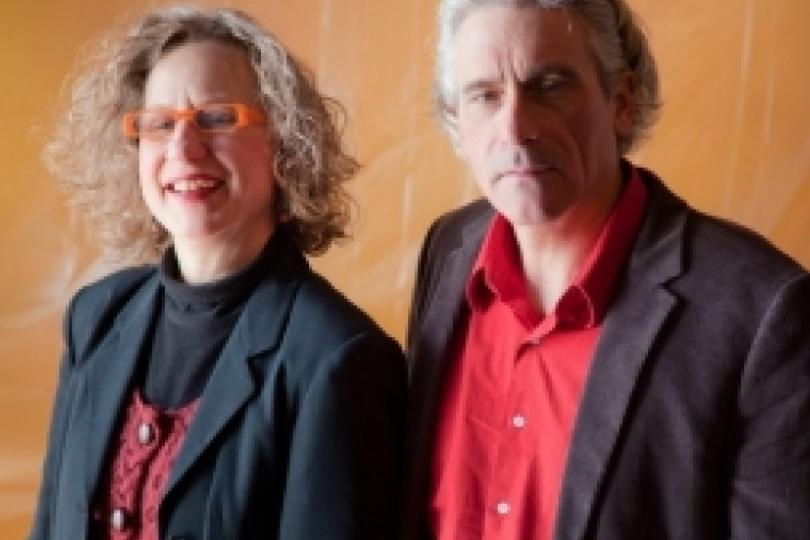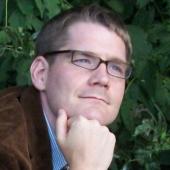Apprenticeship in the Arts
Editorial

There’s a small theater in Minneapolis using small tools and a small budget to reach and impact a very large number of people. Open Eye Figure Theatre, located in South Minneapolis just East of 35W on 24th Street, is housed in a small but powerful theatre space built into a 110-year old historic storefront. But their stage extends well beyond the buildings brick walls out into anywhere they can find and engage audiences. Whether with performances on their home stage, in over 450 neighborhoods with their driveway tour, or at their many appearances at countless festivals and public events Open Eye Figure Theatre goes beyond being simply a theatre company becoming something of a community service organization. Initially, I had an idea to write about apprenticeship in the performing arts. It’s my view that live theater and dance are this terrific melding of manual labor and intellectual rigor. And the way many artists take on apprenticeships and apprenticeship like jobs within arts organizations or specific productions seems to me representative of this marriage of working with hands and working with thoughts. I know several artists who do work or have worked with Open Eye and their experiences there sounded very much like unlabeled apprenticeships. I sought to learn more about how the organization functioned and whether or not they thought of themselves as a mentoring organization. I learned that regardless of how the people at Open Eye think of themselves everything they do has the side effect of providing mentorship and leadership. The founders and driving force behind Open Eye Figure Theatre, Michael Sommers and Susan Haas, were generous enough to meet with me to talk about their views on apprenticeship and what it means to Open Eye. I realized about five minutes into meeting them that I should have simply brought a video camera and let them talk in order to truly capture how significant apprenticeship is to Sommers and Haas. Unfortunately you are stuck with my stumbling through capturing and relaying back some part of what they had to share. I encourage anyone doing creative work of any kind to track down Michael Sommers or Susan Haas and try to get 10 minutes of their time to hear them talk about their work. You’ll thank me if you do.“…if you’re going to pass anything on, any kind of legacy, it’s not having a really great piece on stage, it’s giving these young people that idea that ‘yes, I can do something, I can make something.” – Michael Sommers
Open Eye was founded in 2000 in reaction to the fact that while Michael Sommers was working regularly as a designer, actor, director, composer no one was asking him what he wanted to do as an artist. Not an uncommon driving force behind the creation of an arts organization as Haas points out, “creative artists are used to do other people’s projects.” Teaching artists how to make shows and enabling artists to find their own voices was not a part of the agenda. Apprenticeship, regardless of what trade or skill is being developed, is about learning by doing. Not every task a mentor sets before an apprentice is specifically the skill they have set out to develop but learning is always at the core of the relationship. There is really no way to become a competent and capable artist of any kind without learning by doing. So in this way artists are all apprentices at some point in their careers. Some of us are stuck being mentored by the form itself and perhaps the unfortunate audience stuck watching us learn by doing. An artist is lucky if she is able to find a true mentor who can guide and influence her work without stifling the individual artist’s voice.“Okay, we’ve got our artwork, we’ve got that, that’s what we do. But then I think - what are all the side effects that we can have?” – Susan Haas
The apprenticeship dynamic that seems to flow through all the work happening at Open Eye came about organically. According to Haas Open Eye “evolves because we’re a living, breathing organization. We are responding to everything around us.” They started getting interns from local university programs and bringing in young actors to work shows like their driveway tour. Because Haas and Sommers had been running every part of the theatre the same was asked of the young people coming in to help. As Michael Sommers tells it, “when they come to Open Eye, whether they’re from an intern program at the University or from MCAD it’s you do everything. You’re chopping vegetables, you’re helping build, you’re cleaning, you’re running the front of house, and that’s just the nature of what we do here.” They weren’t trying to be mentors or create an apprenticeship program, they were just trying to get done what needed to be done so they could put on shows and serve the most audience for the least money. But out of that ethos of “you do everything” a pattern of apprenticing has shown through the programs at Open Eye. They have young artists with very limited experience building puppets, making costumes, building sets, designing lighting, creating soundscapes. And as they gain experience they take on more responsibilities moving on to managing programs and sharing their growing knowledge until after several years of working with Open Eye these artists are conceiving of, writing, creating the puppets for, and staging their own original works. And if you look at the unique qualities of recent productions created by emerging artists who have worked under Haas and Sommers’ guidance like the very successful show created in 2010 Milly & Tilly or one of this summer’s driveway tour shows Cow Boat you can see that Haas is sincere when she says, “we’re not teaching everybody how to do Michael’s work. We’re teaching them how to find their own voice.”“I think those two words go together, share and teach.” - Michael Sommers
The result of having these young and emerging artists get their hands on every aspect of running a theater and putting together a show is that they learn how to do all these different things and they learn how much work truly goes into putting on a show for 9 or 90 people. Because Open Eye has been able to rely on so many enthused interns and artists and trust that they could teach them how to get things done, in the last seven years Open Eye’s annual summer driveway tour has reached over 33,000 audience members.“I feel very strongly that Open Eye is not a place for a career, but a place to grow and learn.” - Susan Haas
Beyond their influence on young and emerging artists Sommers also appreciates Open Eye’s growing opportunities to influence and support mature artists. Because the theater can seat anywhere from 60 to 100 people it can feel like a safe and intimate space where mature artists “can find a place or platform to take… risks and steps to try to push in new directions.” But because Open Eye is committed to doing really high quality work mature artists collaborating or borrowing the space are also supported and pushed to do high quality work. And they have the luxury of drawing on this community of engaged audience members that Open Eye has created. In 2010 I started my own theater company, Comedy Suitcase, with my writing partner, Joshua Scrimshaw. I wanted to make theater that’s funny for funny’s sake and theater that’s accessible to audiences of any age without being condescending. But after hearing Haas and Sommers I started thinking about how important collaboration with other artists is to me and what those relationships mean. I started thinking about what I want to communicate to audiences as well as to my fellow theater artists. This idea from Michael Sommers of legacy stemming from giving young people the confidence to know that they can do something creative, that they can make art really reveals why their theatre would evolve into an apprenticing organization. What they care about, even above their work, is their relationships with other people. The choices Sommers and Haas make on behalf of Open Eye have ultimately been in the service of strengthening and deepening their relationships with other people, and that has allowed the people they’ve worked with to feel empowered to make their own work. I’ve realized that I truly hope to have the confidence and humility as an artist to do my work ultimately not simply for my own benefit but in the service of my relationships with other artists and other people. And it’s because of this reaction I’ve had to spending roughly an hour with these two artists that I think Open Eye Figure Theatre could and should serve as a mentoring organization for other theater companies and arts organizations.“…another odd way to look at the mentoring thing is just by supporting mature artists, giving them a chance.” –Michael Sommers




